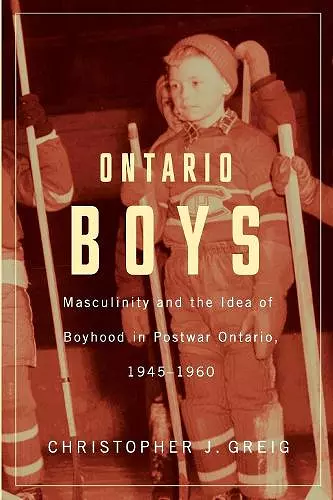Ontario Boys
Masculinity and the Idea of Boyhood in Postwar Ontario, 1945--1960
Format:Paperback
Publisher:Wilfrid Laurier University Press
Published:28th Feb '14
Should be back in stock very soon

Ontario Boys explores the preoccupation with boyhood in Ontario during the immediate postwar period, 1945-1960. It argues that a traditional version of boyhood was being rejuvenated in response to a population fraught with uncertainty, and suffering from insecurity, instability, and gender anxiety brought on by depression-era and wartime disruptions in marital, familial, and labour relations, as well as mass migration, rapid postwar economic changes, the emergence of the Cold War, and the looming threat of atomic annihilation. In this sociopolitical and cultural context, concerned adults began to cast the fate of the postwar world onto children, in particular boys.
In the decade and a half immediately following World War II, the version of boyhood that became the ideal was one that stressed selflessness, togetherness, honesty, fearlessness, frank determination, and emotional toughness. It was thought that investing boys with this version of masculinity was essential if they were to grow into the kind of citizens capable of governing, protecting, and defending the nation, and, of course, maintaining and regulating the social order.
Drawing on a wide variety of sources, Ontario Boys demonstrates that, although girls were expected and encouraged to internalize a ""special kind"" of citizenship, as caregivers and educators of children and nurturers of men, the gendered content and language employed indicated that active public citizenship and democracy was intended for boys. An ""appropriate"" boyhood in the postwar period became, if nothing else, a metaphor for the survival of the nation.
"Christopher Greig sheds fresh light on our understanding of the making, from the late 1940s to the early 1960s, of a recurrent crisis in boyhood. Greig sees this as an illusionary extension of the wider 'crisis in masculinity,' ubiquitous in popular media and professional discourse since the end of the Second World War. 'Ontario Boys' presents a lucid and insightful examination of ideal boyhood models based on simplistic and neoliberal notions in the postwar era of togetherness, teamwork, loyalty, physical health, and boyhood heroism. He contrasts these with popular fears of delinquent juvenile males, who often sought the leadership provided by boys' clubs and Boy Scout movements as an alternative to gang associations. This book offers thoughtful critique of the fears every era manufactures for the overall well-being and vigour of its boyhood-to-manhood maturation processes. It will provoke us to consider that the alarm sirens ringing today for the so-called 'forgotten children' of our schools and local communities, boys failing to succeed according to standards others set, are part of a continuing angst across Ontario and throughout modern societies generally." -- Robert Rutherdale, Algoma University, co-editor, with Magda Fahrni, of 'Creating Postwar Canada: Community, Diversity, and Dissent, 1945-1975' (2009) and author of 'Hometown Horizons: Local Responses to Canada's Great War' (2004)
"Ontario Boys represents a valuable contribution to the literature on boyhood.... It not only provides scholars with several strong arguments on how masculinity shapes our understanding of boyhood, but it does so in an engaging and well-written manner." -- Jason Reid, Ryerson University -- Historical Studies in Education, 26, 2, Fall 2014, 201506
ISBN: 9781554589005
Dimensions: 229mm x 152mm x 13mm
Weight: 320g
220 pages